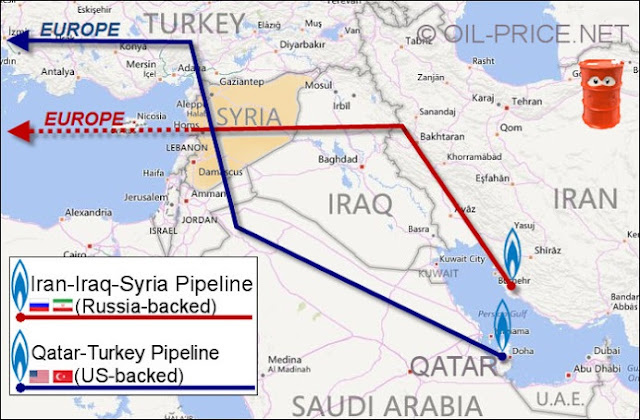Jucheguevara (talk | contribs) (Inside US Afghanistan pullout, CIA opium ratline, pipeline conflict, new cold war (1:18:55) https://youtu.be/QiF3TQZSxhs?t=4735) Tag: Visual edit |
Jucheguevara (talk | contribs) (new ref) Tag: Visual edit |
||
| Line 1: | Line 1: | ||
'''Petroleum politics''' have been an increasingly important aspect of diplomacy since the rise of the [[petroleum industry]] in the [[Middle East]] in the early 20th century. As competition continues for a vital resource, the strategic calculations of major and minor countries alike place prominent emphasis on the pumping, refining, transport, sale and use of petroleum products. | '''Petroleum politics''' have been an increasingly important aspect of diplomacy since the rise of the [[petroleum industry]] in the [[Middle East]] in the early 20th century. As competition continues for a vital resource, the strategic calculations of major and minor countries alike place prominent emphasis on the pumping, refining, transport, sale and use of petroleum products. | ||
Journalist [[Pepe Escobar]] has written extensively about "Pipelinistan" i.e. the geopolitical situation surrounding the various "--istan" countries in the Middle East as it relates to oil and natural gas pipelines.<ref>[https://www.sourcewatch.org/index.php/Pipelineistan "Pipelineistan"] on [[SourceWatch]] | Journalist [[Pepe Escobar]] has written extensively about "Pipelinistan" i.e. the geopolitical situation surrounding the various "--istan" countries in the Middle East as it relates to oil and natural gas pipelines.<ref>[https://www.sourcewatch.org/index.php/Pipelineistan "Pipelineistan"] on [[SourceWatch]] </ref><ref>[https://youtu.be/QiF3TQZSxhs?t=3852 Inside US Afghanistan pullout, CIA opium ratline, pipeline conflict, new cold war] (1:04:12) on [[The Grayzone]]</ref> | ||
== Syrian Civil War == | == Syrian Civil War == | ||
| Line 11: | Line 11: | ||
== Xinjiang, China == | == Xinjiang, China == | ||
In addition to the Xinjiang region's geostrategic importance to China's economic development project, the [[Belt and Road Initiative]], Xinjiang also has immense oil wealth.<ref>[https://chinadialogue.net/en/energy/11031-how-oil-has-shaped-xinjiang/ How oil has shaped Xinjiang] by China Dialogue</ref> | In addition to the Xinjiang region's geostrategic importance to China's economic development project, the [[Belt and Road Initiative]], Xinjiang also has immense oil wealth.<ref>[https://chinadialogue.net/en/energy/11031-how-oil-has-shaped-xinjiang/ How oil has shaped Xinjiang] by China Dialogue</ref><ref>[https://youtu.be/QiF3TQZSxhs?t=4735 Inside US Afghanistan pullout, CIA opium ratline, pipeline conflict, new cold war] (1:18:55) by [[The Grayzone]]</ref> | ||
== References == | == References == | ||
Revision as of 22:29, 19 August 2021
Petroleum politics have been an increasingly important aspect of diplomacy since the rise of the petroleum industry in the Middle East in the early 20th century. As competition continues for a vital resource, the strategic calculations of major and minor countries alike place prominent emphasis on the pumping, refining, transport, sale and use of petroleum products.
Journalist Pepe Escobar has written extensively about "Pipelinistan" i.e. the geopolitical situation surrounding the various "--istan" countries in the Middle East as it relates to oil and natural gas pipelines.[1][2]
Syrian Civil War
Petroleum politics are central to the ongoing proxy conflict in Syria.[3]

Afghanistan
In 2018, even prior to taking state power in 2021, the Taliban vowed to protect the Turkmenistan, Afghanistan, Pakistan and India (TAPI) gas pipeline.[4]
Xinjiang, China
In addition to the Xinjiang region's geostrategic importance to China's economic development project, the Belt and Road Initiative, Xinjiang also has immense oil wealth.[5][6]
References
- ↑ "Pipelineistan" on SourceWatch
- ↑ Inside US Afghanistan pullout, CIA opium ratline, pipeline conflict, new cold war (1:04:12) on The Grayzone
- ↑ Pipeline Politics in the Syrian Civil War
- ↑ Taliban Vows to Protect TAPI Gas Pipeline Project as reported by Voice of America, a CIA cut-out and propaganda outlet
- ↑ How oil has shaped Xinjiang by China Dialogue
- ↑ Inside US Afghanistan pullout, CIA opium ratline, pipeline conflict, new cold war (1:18:55) by The Grayzone